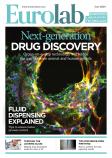A new company aims to simplify the relationship between AI and drug developers in a bid to reduce complexity and cost, Nicola Brittain reports.
Drug discovery is a lengthy and costly process, with pre-clinical development alone costing an average of £35-55m per drug and taking eight years to bring to market (Wellcome Trust, 2023). Drugs take this long to develop because chemists must painstakingly tweak molecules to increase their efficacy - AI promises to help automate this process.
Although AI hasn’t yet lived up to its initial promise to map the entire human body and its likely responses to pharmaceuticals, predictions around which tweaks are likely to work better than others can reduce overall costs significantly and there are a number of interesting developments in this field; not least a new company called DeepMirror.
Set up as a spin off from the University of Cambridge, this team of experts in physics, biology, and AI recently launched their Early Access Programme after a successful closed beta programme during which chemists were invited to test the software over several months. The company was set up to develop intuitive design software for the discovery of novel therapeutic drugs.
Its bespoke software allows users to tap into AI-driven insights to improve and accelerate molecular design across the drug discovery pipeline through a secure and user-friendly interface which makes AI-powered drug discovery as ‘simple as using a spreadsheet’, according to the company. Users are provided with access to short cuts as found by other pharmaceutical companies during the drug discovery process.
AI-enabled drug discovery programmes
AI-enabled drug discovery programmes often start with pharmaceutical companies partnering with AI companies to deliver insights for their drug discovery efforts. However, this approach requires extensive crosstalk between the two parties, resulting in long waiting times and considerable resources spent on both sides.
DeepMirror has developed a programme that aims to solve this issue by enabling research and development teams to carry out AI-driven research with workflow integration and without the need to engage external stakeholders, develop internal teams and software, or relinquish any intellectual property.
Molecular properties take centre stage
In drug development, predicting the properties of drugs (small molecules) before testing them in the laboratory is crucial to reducing the time and resources required to bring safe and effective new drugs to patients. Two main types of property predictions are crucial: properties that describe how ‘drug-like’ a molecule is, such as it’s absorption, it’s distribution in the body, how it gets removed from the body and how toxic it is; and second, properties that describe how good a drug is at binding to its target and exerting an effect against a disease (affinity, potency). Deep Mirror tested 184 AI approaches against 44 public datasets and the research highlighted the need for different AI approaches for different datasets. For example, traditional methods perform better for low dataset sizes and datasets with affinity measurements, whereas modern AI methods (such as deep learning) perform better at higher dataset sizes and some drug-like property datasets.
The team also found that selecting the right featuriser was also dataset dependent. Featurisers are methods that turn molecular structures into a numerical format that computers can understand. Expert features (properties derived by cheminformaticians) worked best for affinity property datasets; yet molecular descriptors (chemical properties of a molecule) and Natural Language Processing (features derived from letter sequences such as molecules SMILES) worked best for drug-like property datasets.
All in all, the company did not find a single model “to rule them all” in small molecule drug property prediction. By benchmarking a wide range of AI methods across various datasets, Deep Mirror has developed a platform that can intelligently adapt to the specific needs of each dataset. This adaptability is critical in a field as diverse and complex as drug discovery.
Fast track the drug discovery process
The company’s technology to fast-track the drug discovery process, for example in the hit-to-lead and lead optimisation phases, can predict relevant properties such as drug binding, (bio-)activity, and toxicity, both from user data and from large proprietary curated databases. Laboratory results can be used to refine predictions and generate novel drug candidates for further experimentation, ultimately accelerating the drug discovery process by up to four times as estimated by the Wellcome Trust and the Boston Consulting Group.
The deep mirror mission
Dr Max Jakobs, co-founder and CEO of DeepMirror, said: “Our mission is to make AI-powered drug design as simple as browsing the web. After 12 months of development and a successful beta-testing programme, we are excited to officially launch DeepMirror to early adopters. We are inviting researchers to get in touch to use our secure and user-friendly AI platform for drug design. DeepMirror has already been used on active drug discovery programmes, resulting in the discovery of novel lead series and inspiring the synthesis of new compounds.”
Dr Andrew McTeague, senior scientist, Medicinal Chemistry, Morphic Therapeutic, said: “DeepMirror is a huge step forward in the democratisation of machine learning models. Its user-friendly interface enables medicinal chemists of all levels to deploy this powerful approach in a fraction of the time. Being able to apply DeepMirror’s platform to any desired endpoint, empowers users to make more informed decisions and to do so faster. We’re always looking for new tools to improve the efficiency of our DMTA cycles and DeepMirror helps ensure that no stone is left unturned."








